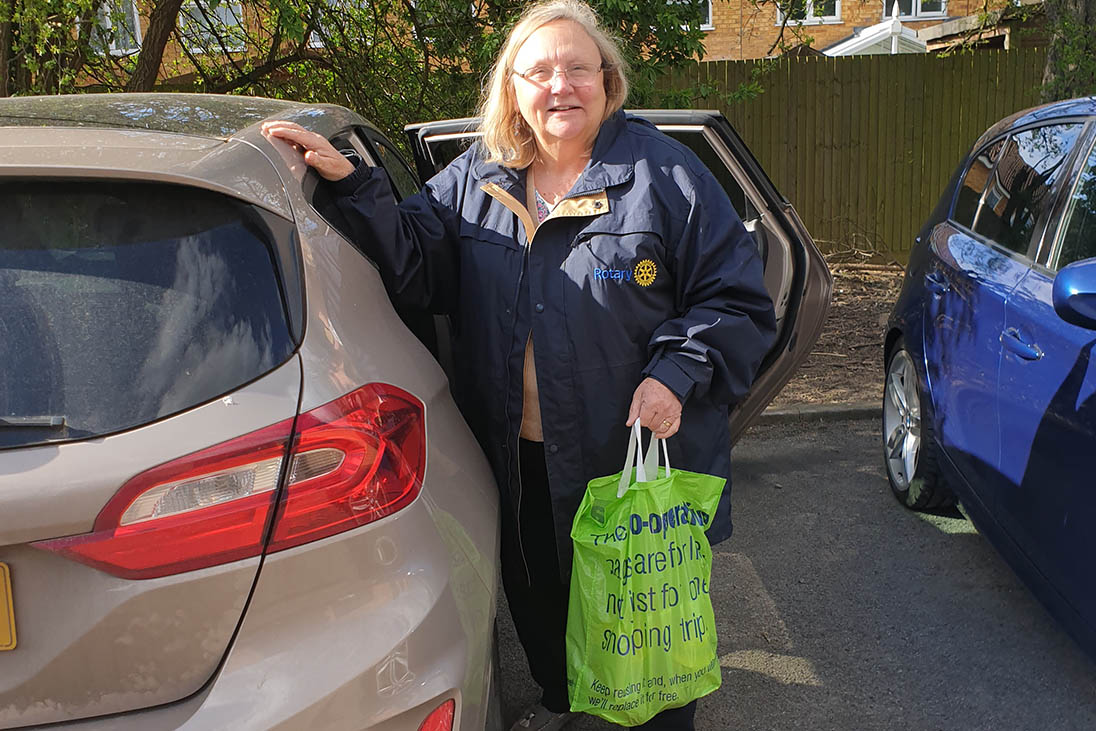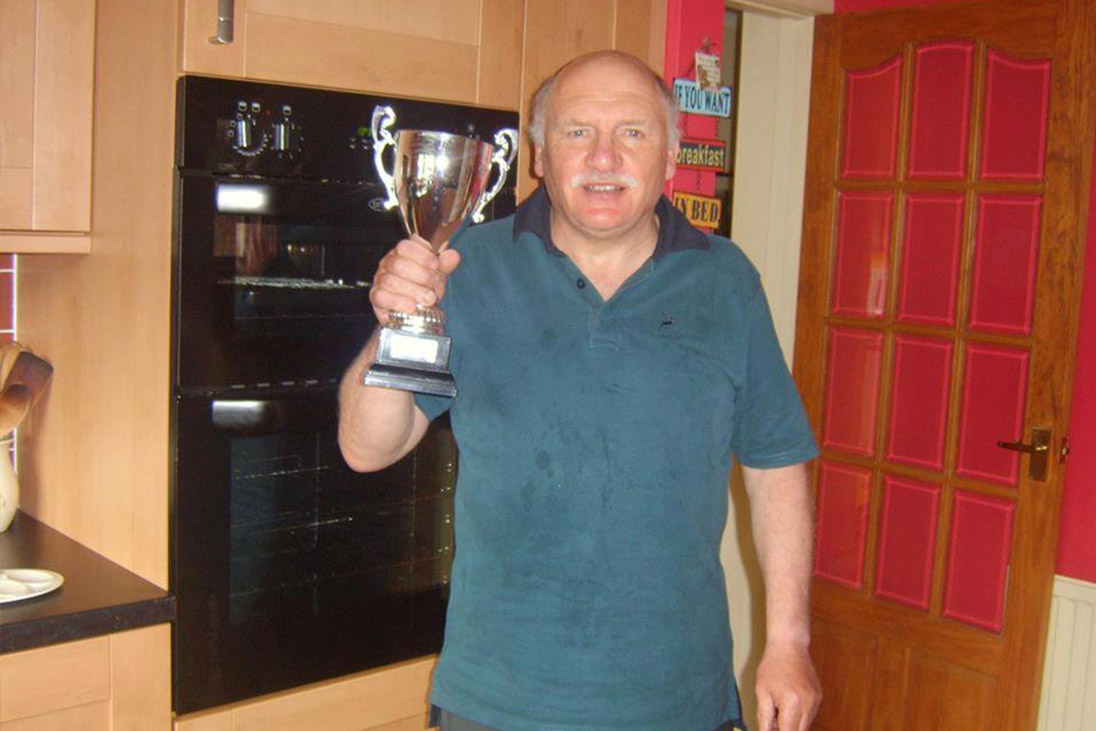Last Week
It was an unofficial meeting as 1st May is a public holiday. As the unofficial meeting on Good Friday was a success probably because of the need to chat to other people, President Jean decided to do it again with a purely social meeting and you can see how successful it was with Nigel Bellamy joining us from Botswana.
This Week
"I am interested in sustainable NPO models and social change. An NPO is a business striving to achieve social impact. I have experience in taking NPO's from the brink of closure due to financial or management problems back to being sustainable and functioning.''
There is a lot more to Lifeline than counselling potential suicides and it will be interesting to see how
the organisation has broadened its scope and kept up with change.
We’ve lived in a synthetic world for more than 70 years. How much longer can it last?
In 1950, a Philadelphia toy company came out with a new accessory for electric-train enthusiasts: snap-together kits of plastic buildings for a place it called Plasticville U.S.A. Sets of plastic people to populate the town were optional.
Today we all live in Plasticville. But when, exactly, did we take our first steps into this synthetic world? Some say it was in 1870, when the inventor John Wesley Hyatt patented a malleable compound that was originally conceived as a substitute for an increasingly scarce commodity: ivory. It was created from a natural polymer — the cellulose in cotton — combined with other ingredients; Hyatt’s brother Isaiah dubbed the new material celluloid, meaning “like cellulose.”
Others fix the date to 1907, when a Belgian émigré named Leo Baekeland cooked up Bakelite; the first fully synthetic polymer, it was made entirely of molecules that couldn’t be found in nature. With the product’s invention, the Bakelite Corporation boasted, humans had transcended the classic taxonomies of the natural world: the animal, mineral, and vegetable kingdoms. Now we had “a fourth kingdom, whose boundaries are unlimited.”
Bakelite was invented to replace another scarce natural substance: shellac, a product of the sticky excretions of the female lac beetle. Demand for shellac began shooting up in the early 20th century because it was an excellent electrical insulator. Yet it took 15,000 beetles six months to make enough of the amber-colored resin needed to produce a pound of shellac. To keep up with the rapid expansion of the electrical industry, something new was needed.
As it turned out, the plastic Leo Baekeland invented by combining formaldehyde with phenol (a waste product of coal) and subjecting the mixture to heat and pressure was infinitely more versatile than shellac. A dark-colored, rugged material with a sleek, machinelike beauty, it could be precisely molded and machined into nearly anything. Contemporaries hailed its “protean adaptability” and marveled at how Baekeland had transformed something as foul-smelling and nasty as coal tar — long a discard in the coking process — into this wondrous new substance.
The 1920s and ’30s saw an outpouring of new materials from labs around the world. One was cellulose acetate, a semisynthetic product (plant cellulose was one of its base ingredients) that had the easy adaptability of celluloid but wasn’t flammable. Another was polystyrene, a hard, shiny plastic that could take on bright colors, remain crystalline clear, or be puffed up with air to become the foamy polymer DuPont later trademarked as Styrofoam.
DuPont also introduced nylon, its answer to the centuries-long search for an artificial silk. When the first nylon stockings were introduced, after a campaign that promoted the material as being as “lustrous as silk” and as “strong as steel,” women went wild. Stores sold out of their stock in hours, and in some cities, the scarce supplies led to nylon riots. Across the ocean, British chemists discovered polyethylene, the strong, moisture- proof polymer that would become the sine qua non of packaging. Eventually, we’d get plastics with features nature had never dreamed of: surfaces to which nothing would stick (Teflon), fabrics that could stop a bullet (Kevlar).
Though fully synthetic like Bakelite, many of these new materials differed in one significant way. Bakelite is a thermoset plastic, meaning that its polymer chains are hooked together through the heat and pressure applied when it is molded. The molecules set the way batter sets in a waffle iron. And once those molecules are linked into a daisy chain, they can’t be unlinked. You can break a piece of Bakelite, but you can’t melt it down to make it into something else.
Polymers such as polystyrene and nylon and polyethylene are thermoplastics; their polymer chains are formed in chemical reactions that take place before the plastic ever gets near a mold. The bonds holding these daisy chains together are looser than those in Bakelite, and as a result these plastics readily respond to heat and cold. Unlike Bakelite, they can be molded and melted and remolded over and over again. Their shape-shifting versatility is one reason thermoplastics quickly eclipsed the thermosets.
Much of the plastic we’ve produced is with us still. Humans could disappear from the earth tomorrow, but many of the plastics we’ve made will last for centuries.
It’s understandable why many at the time saw plastics as the harbinger of a new era of abundance. Plastics, so cheaply and easily produced, offered salvation from the haphazard and uneven distribution of natural resources that had made some nations wealthy, left others impoverished, and triggered countless devastating wars. Plastics promised a material utopia, available to all. At least, that was the hopeful vision of a pair of British chemists in 1941. “Let us try to imagine a dweller in the ‘Plastic Age,’” Victor Yarsley and Edward Couzens wrote. “This ‘Plastic Man’ will come into a world of colour and bright shining surfaces ... a world in which man, like a magician, makes what he wants for almost every need.”
That world was delayed in coming. Most of the new plastics discovered in the 1930s were monopolized by the military over the course of World War II. Production of plastics leaped during the war, nearly quadrupling from 213 million pounds in 1939 to 818 million pounds in 1945. Come V-J Day, all that production potential had to go somewhere, and plastics exploded into consumer markets. Just months after the war’s end, thousands of people lined up to get into the first National Plastics Exposition in New York, a showcase of the new products made possible by the plastics that had proven themselves in the war. For a public weary of two decades of scarcity, the show offered an exciting and glittering preview of the promise of polymers. Here was the era of plenty that the hopeful British chemists had envisioned. “Nothing can stop plastics,” the chairman of the exposition crowed.
Plastics production expanded explosively, with a growth curve that was steeper even than the fast-rising GNP’s. Thanks to plastics, newly flush Americans had a never-ending smorgasbord of affordable goods to choose from. The flow of new products and applications was so constant it was soon the norm. Tupperware had surely always existed, alongside Formica counters, Naugahyde chairs, red acrylic taillights, Saran wrap, vinyl siding, squeeze bottles, push buttons, Barbie dolls, Lycra bras, Wiffle balls, sneakers, sippy cups, and countless more things. The nascent industry partnered with the press to sell consumers on the virtue of plastics. “Plastics are here to free you from drudgery,” House Beautiful promised housewives in a special 50-page issue in October 1947 titled “Plastics ... A Way to a Better, More Carefree Life.”
That proliferation of goods helped engender the rapid social mobility that took place after the war. We were a nation of consumers now, a society increasingly democratized by our shared ability to enjoy the conveniences and comforts of modern life. Through the plastics industry, we had an ever-growing ability to synthesize what we wanted or needed, which made reality seem infinitely more open to possibility, profoundly more malleable. Now full-fledged residents of Plasticville, we began to believe that we too were plastic. As House Beautiful assured readers in 1953: “You will have a greater chance to be yourself than any people in the history of civilization.”
It’s hard to say when the polymer rapture began to fade, but it was gone by 1967 when the movie The Graduate came out. Somewhere along the line, plastic’s penchant for inexpensive imitation came to be seen as cheap ersatz. So audiences knew exactly why Benjamin Braddock (as played by Dustin Hoffman) was so repelled when a family friend took him aside for some helpful career advice: “I just want to say one word to you ... Plastics!” The word no longer conjured an enticing horizon of possibility but rather a bland, airless future, as phony as Mrs. Robinson’s smile.
Today, few other materials we rely on carry such a negative set of associations or stir such visceral disgust. Norman Mailer called it “a malign force loose in the universe ... the social equivalent of cancer.” We may have created plastic, but in some fundamental way it remains essentially alien, ever seen as somehow unnatural — though it’s really no less natural than concrete, paper, steel, or any other manufactured material. One reason may have to do with its preternatural endurance. Unlike traditional materials, plastic won’t dissolve or rust or break down, at least, not in any useful time frame. Those long polymer chains are built to last, which means that much of the plastic we’ve produced is with us still — as litter, layers of landfill, and detritus in the ocean. Humans could disappear from the earth tomorrow, but many of the plastics we’ve made will last for centuries. Each of them offers an object lesson on what it means to live in Plasticville, enmeshed in a web of materials that are rightly considered both the miracle and the menace of modern life.
The story of plastics is riddled with those kinds of paradoxes. We enjoy an unprecedented level of material abundance and yet it often feels impoverishing, like digging through a box packed with Styrofoam peanuts and finding nothing else there. We take natural substances created over millions of years, fashion them into products designed for a few minutes’ use, and then return them to the planet as litter that we’ve engineered to never go away. We enjoy plastics-based technologies that can save lives as never before but that also pose insidious threats to human health. We bury in landfills the same kinds of energy-rich molecules that we’ve scoured the far reaches of the earth to find and excavate. We send plastic waste overseas to become the raw materials for finished products that are sold back to us.
These paradoxes contribute to our growing anguish over plastics. Yet the plastics-related issues that dominate headlines today surfaced in earlier decades. Studies that show traces of plastics in human tissue go back to the 1950s. The first report of plastic trash in the ocean was made in the 1960s. Suffolk County, New York, enacted the first ban on plastic packaging in 1988.
But the stakes are much higher now. As Plasticville sprawls farther across the landscape, we become more thoroughly entrenched in the way of life it imposes. It is increasingly difficult to believe that this pace of plasticisation is sustainable, that the natural world can long endure our ceaseless “improving on nature.” But can we start engaging in the problems plastics pose? Is it possible to enter into a relationship with these materials that is safer for us and more sustainable for our offspring? Is there a future for Plasticville?
Excerpt from Plastic: A Toxic Love Story by Susan Freinkel. Copyright © 2011 by Susan Freinkel. Reprinted by permission of Houghton Mifflin Harcourt Publishing Co. All rights reserved.





















